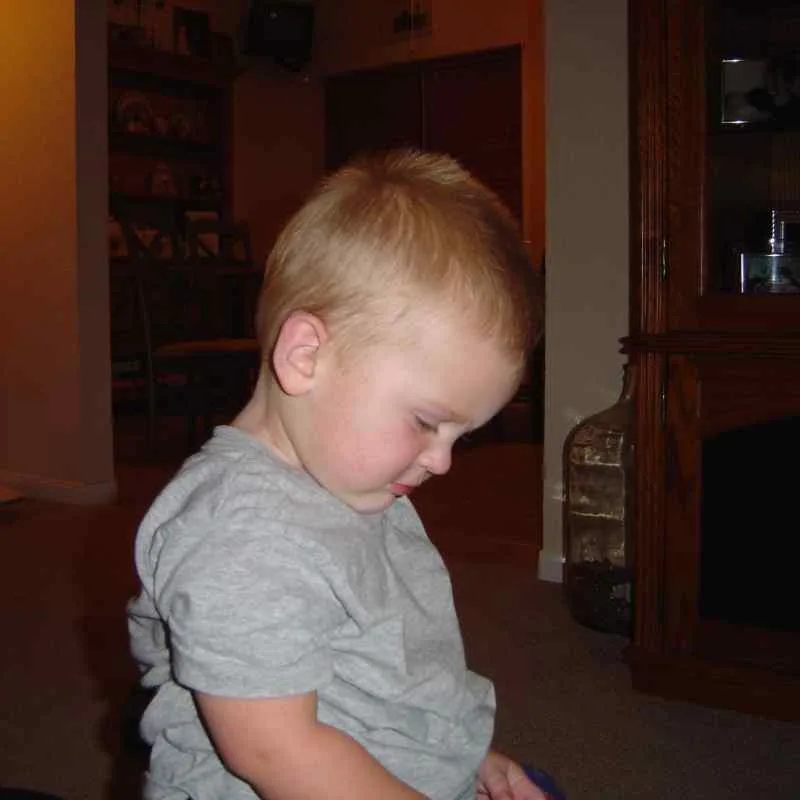- Clay Moon Phase Wall Hanging - July 4, 2023
- What To Do When a Toddler Won’t Keep Their Blanket On - June 10, 2023
- How Do Child Locks Work in Cars? (And When To Use Them!) - June 10, 2023
When expecting a new child, it’s important to prepare your toddler for the arrival of their new sibling — but don’t expect perfection right off the bat. A new baby brings a lot of change in routine, which can upset a toddler and lead to temper tantrums and other unwanted behaviors. Fortunately, it doesn’t take too long for a toddler to adjust to a new baby in the home.
It takes toddlers around three to six months to adapt to a significant change, such as the arrival of a new baby. During the transition period, toddlers may engage in negative or regressive behavior. Involving your toddler in the baby’s care, along with patience, is key.
There are many ways to help your toddler feel more positive about having a baby in the home. In this article, I’ll outline why toddlers may struggle with the arrival of a baby and how you can encourage them to adjust to the situation faster.

Why Your Toddler Takes 3-6 Months To Adjust to a New Baby
A new baby is a significant life event, and your toddler might feel unsettled and apprehensive when the new child arrives. Because babies require a great deal of attention and care, your toddler may even experience emotions such as anger or jealousy.
Although not ideal, this is totally normal.
Here are some reasons toddlers behave this way and common reactions you might see your toddler display.
Your Toddler Fears Not Being the Baby Anymore
You’ve brought your new baby into the home and, ever since, noticed a serious change in your toddler.
Suddenly, they’re behaving like a baby again — acting as though they don’t know how to eat on their own or use the toilet– despite being potty trained. This apparent loss of skills is common in regressive behavior.
Other signs of toddler regression (source) include:
- Temper tantrums
- Difficulty sleeping and or waking up during the night
- Immature ways of communicating, such as using baby talk
Toddlers can regress during stressful situations or when they experience massive changes in their routines (source). They regress because they’re craving predictability and control, both of which the presence of a new baby threatens.

Your Toddler Doesn’t Know How To Process Their Feelings
If your toddler is aggressive towards the new baby, such as by hitting or biting them, this is alarming to see, but note that it’s a cry for help. It signals that your toddler is feeling jealous.
Toddlers can resort to aggressive behavior because they find adjusting to the new living conditions difficult and don’t know how to process their feelings (source).
Depending on your toddler’s age, they may not understand how to label or recognize certain emotions. They might feel confused about their “big feelings,” causing them to lash out.
Your Toddler Doesn’t Want To Share You
Feeling possessive is a typical phase toddlers go through. During this time, they start to test their boundaries with possessive behavior, such as by laying claim to their toys and trying to gain more independence (source).
A new baby is a significant event in your toddler’s life, so it’s normal for them to become more possessive and clingy with you as they try to adjust (source).
Your toddler might try to get closer to you because they feel threatened by the new baby in the family that is getting all your love and attention.
How To Help Your Toddler Adjust to Their New Sibling
Caring for a newborn while simultaneously trying to get your toddler to adjust to them can feel overwhelming. You can do some essential things to help your toddler feel more optimistic about their baby sibling.
Give Your Toddler the Spotlight
If you tell your toddler that they have to be the bigger sibling and look after the baby, this can increase their frustration and cause them to regress out of a need for attention.
Instead of doing the above, tell your toddler how much the baby will love them and how wonderful they are as an older sibling. This will show your toddler they’re still important and worthy of attention.
When the new baby arrives, it’s common for everyone to make a big fuss over them. Try to emphasize celebrating your toddler, not just your new baby, as this can help them feel connected to you and the baby (source).
For example, help your toddler choose a gift for the new baby and give them a gift from their new sibling.
Get Your Toddler Involved
Instead of calling the baby your baby, refer to it as “our baby” when talking to your toddler. This makes them feel that your family is a team. Examples include saying things like, “Should we hold our baby together?” or “Let’s feed our baby” (source).
Getting your toddler involved with looking after the new baby is a good idea. You can give them small tasks to do so they feel important.
When you involve your toddler in caring for your baby, it’s a win-win situation. It enables you to spend time with them, so they get attention, and encourages them to feel positive towards the baby.
Stick to Your Regular Routines As Much as Possible
While you might feel that your routines are being thrown out the window because of the new baby, you need to stick to the normal routine for your toddler as much as you can. This ensures they don’t feel out of control, ignored, or threatened by the baby.
For example, follow their usual feeding and sleeping times, and don’t neglect your quality time together, whether that involves reading together for half an hour every day or going for walks after dinner.
Doing things alone with your toddler is crucial, so they get your undivided attention from time to time.
Maintaining your toddler’s routines outside of the home, such as their play dates and extracurricular activities, is essential. This ensures better adjustment to having a baby around because it doesn’t throw their world upside-down.
Here’s a very insightful YouTube video on how to help your toddler adjust to a new baby in the home:
Things To Avoid When Your Toddler Struggles To Adjust
There are some things to avoid when trying to help your toddler adjust to their new sibling.
Don’t Punish Your Toddler
Even if your toddler has done something wrong, such as yelling at the baby, punishing them won’t help. Avoid spanking or screaming at them; this can have the opposite effect of making them even more aggressive and jealous.
Toddlers don’t usually make a connection between their bad behavior and the punishment they’re receiving, such as a spanking. They will, however, receive the message that it’s acceptable to hit or shout at someone when they’re angry (source).
Instead of punishing your toddler, be firm and transparent with them about what they shouldn’t do, such as being rough with the baby. However, it is very important to acknowledge their feelings.
An example of what you could say is, “I know you want to help, and you’re a great helper, but we are always gentle with our baby because we don’t want to hurt him” Or, you could say, “I know you feel frustrated because I have to nurse our baby now, but we will go to the park in 10 minutes.” Ensure that you follow through on any promises made.
Don’t Force Your Toddler To Get Involved
While encouraging your toddler to take an interest in the new baby can help them to feel connected and involved, if your toddler wants to ignore the baby for a while, you should allow them to do this.
Some kids initially ignore their baby siblings to get used to the situation in their own time. It’s important to support and listen to them during this period and continue prioritizing quality time with them.
Final Thoughts
When you bring a new baby home, it can take your toddler around three to six months to adjust to the unique and sometimes overwhelming situation of having a baby around. Luckily, you can do things to help them adjust faster. These include:
- Give your toddler positive attention, such as praise.
- Involve them in looking after the baby.
- Maintain their routines as much as possible.
Author Notes:
Teresa is a Registered Nurse in the State of Texas and the mother of two. Opinions and insights on childcare are based on professional knowledge, academic research, and personal experience.
Recommended Reading:
- Why Does Your Toddler Keep Undressing at Night?
- 5 Best Toddler Ride-On Cars With Parental Remote Control
Make Your Own Beautiful Living Succulent Wreath Centerpiece! Complete video course by Jeannine Romero now available through Skillshare.
